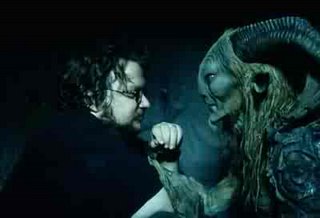
Guillermo Del Toro is a film director from Mexico. He has directed a number of horror and fantasy films, including Cronos (1992), Mimic (1997), The Devil's Backbone (2001), Blade II (2002), and Hellboy (2004).
Del Toro's latest project is the fantasy film Pan's Labyrinth, set for release in America on December 29, 2006. The Official Movie Website press release summarizes the film:
"PAN'S LABYRINTH is a fanciful and chilling story set against the backdrop of a fascist regime in 1944 rural Spain. The film centers on Ofelia, a lonely and dreamy child living with her mother and adoptive father; a military officer tasked with ridding the area of rebels. In her loneliness, Ofelia creates a world filled with fantastical creatures and secret destinies. With post-war repression at its height, Ofelia must come to terms with her world through a fable of her own creation."
I bring attention to this film not only because of my appreciation of the fantasy and horror genres, and my appreciation for the creativity and directoral work of Del Toro, but also because of mention of this film on WildHunt, a Pagan blog. WildHunt was intrigued by the film when it made its debut at Cannes due to Pagan themes within it. (We might also note that a remake of the classic 1973 horror film The Wicker Man that touched on Pagan themes is also in production.) The blog includes an excerpt of dialogue from the film that illustrates this element:
OFELIA: My name is Ofelia. Who are you?
PAN: Me? I've had so many names...Old names that only the wind and the trees can pronounce. I am the mountain, the forest and the earth. I am...I am a faun. Your most humble servant, Your Highness.
This intersection between popular culture and religious studies is of great interest to me for a number of reasons.
First, as Western culture continues its journey in late modernity or postmodernity it seems as though fantasy is increasingly popular as opposed to science fiction in previous decades.
Second, various subcultures are drawing upon this interest in fantasy, whether evangelicals and other varieties of Christians through The Chronicles of Narnia, or Pagans with their interest in Pan's Labyrinth.
Third, although a number of film critic websites have praised Labyrinth, it has thus far received little attention on the radar screen of American pop culture.
Fourth, as the film release draws closer and its promotion increases it will be interesting to watch the response of some segments of evangelicalism. One website has already linked it with Satanism and pedophilia. But then again, it takes issue with the mythology within Narnia as well.
I'll try to be optimistic here in my hopes for evangelical engagement with popular culture with this films' release later this year. My hope is that American evangelicals will develop a more sophisticated form of engagement with myth, symbolism, religion, and culture than we have previously in the culture wars. I don't know that I should hold my breath.
Image source: http://www.twitchfilm.net/pics/pan_lab_6.jpg
2 comments:
I saw this film as being a representation of the loss or destruction of culture under the fascist regime in Italy.
It's an old post, but an interesting movie with a lot of complex themes.
Thanks for your comments, Laura. Certainly Pan's Labyrinth does touch on fascism in Spain, but this is only one level of the film. It is much more complex than that, and the more significant and rich level of the film is the fantasy realm of Ofelia.
Post a Comment